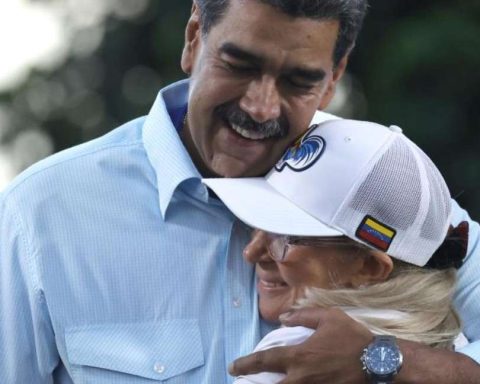
Record that is crossed, record that breaks. Bárbara Hernández, a 36-year-old Chilean specialist in icy waters, has shown that gender does not matter when carrying out a profession. She is a professional swimmer, she has faced the cold waters of Cape Horn, has reached new records and has been the first person in the world to travel the longest distance between the Pacific and Antarctic Oceans.
In addition to her successful swimming career, Hernández is a psychologist and has a master’s degree in psychology from the University of Chile.
in conversation with The counterHernández points out how rare it has become to be a successful person in the world of swimming and become a role model for thousands of girls and women throughout the country.
“It feels weird sometimes. There are days that I cannot measure the impact that one can have on people until women write to you, girls do my homework and that is very nice, it is very gratifying, but I also feel that it is a tremendous responsibility. To be able to live up to everything those women and girls see of me. In a certain way, I can also accompany them in their own processes, in their challenges, dreams, desires”, she assures.
“Show them that our dreams, our purposes and desires are the result of hard, hard work; of difficult, complex, painful days. I believe that in this way I feel that I can accompany or help them. And there I do feel that I am up to the task and that I can be a role model in a certain way, with all the humility and good sense that this may mean”, she maintains.
The nickname “Ice Mermaid”, imposed by the press, generated discomfort at first, which, in the opinion of the excellent swimmer, was a possibility of being able to appropriate that nickname and be able to transform it in her opinion.
“I feel that at first it complicated me a bit, because I felt that I was always the swimmer or the women who are linked to the sea, or to the water, we are always the sirens and that men always have a much rougher nickname, much more empowered by so to speak Much more adventurous,” she posits. But that, from a competition, that meaning changed forever.
“In Aysén, after swimming in my first glaciers, they nicknamed me the ‘ice siren’. I still learned to love that nickname, because it gives me the opportunity to talk about these things. Ok, yes, I’m willing to be a mermaid, but not like any other. But a very extreme siren, very rude, well connected with the environment and nature, but also with everything that swimming in adversity means, ”she says.
“I learned to appropriate this nickname, to have a lot of affection for it, to be grateful that I am recognized worldwide as ‘The Chilean Ice Mermaid’… it even sounds pretty (laughs), but it also gives me this opportunity, to be able to give it a meaning that be mine, own and to be able to discuss it and talk about it openly through the press and the media”, he addresses.
The process, as you can imagine, has not been easy. It is already difficult for a woman in the world, imagine in Chile. As for the process she went through and the months of work that brought her to where she is now, the swimmer expresses that it has been difficult, adding that due to all the effort she put in, she earned the right to do the sport she loves.
“It has been complex, it means continually making decisions, it means learning to believe the story and say this is my dream, it is my project, my desire. What am I willing to do for him and for how long? It has meant building opportunities, making differences visible and, above all, learning to persevere. All that most people see as a result now is the last seven years of my life and before that the last 20. It has been very complex, ”she argues.
“I feel that I earned the right and the opportunity to be able to do this sport that I love, in Chile, to have the support of the authorities, that different institutions believe when I tell them ‘hey, I want to go swimming 100 km, I can be the first Latin American’ or ‘my purpose is to be the first person in the world to end up swimming this distance in Antarctica’. It has meant working very conscientiously, very professionally, breaking barriers all the time, which are almost always stereotypes such as what a high-performance female athlete means to what it means to swim with hypothermia, on ice, in really extreme conditions”, Add.
Thousands of women want to fulfill their dreams, but there is always a macho society that stops them. That is why Hernández sends a message to all women, so that they fulfill their dreams.
“First of all, that we recognize ourselves as a community -I put the community of endurance- and that we are willing to accompany us, to help us, to support us in complex days. For us to lose our fear of the word failure, which is almost always a superimposed term, for us to recognize that the only failure is to stop trying. That we are loyal to our dreams, to our purposes and that they work hard and that they trust with a lot of love towards themselves, that everything we dream is that it is calling us and if it is calling us it is because it is waiting for us”, he affirms.
Today is March 8, and unlike what many believe, this is a date of commemoration and not of celebration. This is why the psychologist with a master’s degree in psychology at the University of Chile, assures that there are still many pending challenges in matters of eradicating machismo and normalizing, that, in the society of the 21st century, women can do what they propose to the same That men.
“On the one hand, it is to continue making all the differences visible, taking charge of building the changes we need. That we women continue to earn those spaces, which are by right, and that we work on equal opportunities. That everything we make visible and even the press and the authorities make visible what is the work of women in different areas, fields, professions, passions, is what motivates the girls of the present and the girls who come and adult women too to assume and believe that absolutely nothing is impossible and that we can build exactly the opportunities we need”, he says.
Despite the progress, the swimmer shares the instances where she has been uncomfortable, where some journalists have even asked her how well the swimsuit fits her. Unthinkable questions for a man in the same field.
“In general, I don’t have bad experiences with the Chilean press except a couple of times where they have been asking me how many times I lost or gained weight for a certain swim, how well or badly the color of my swimsuit looks on me, questions to which I immediately I was able to answer and I made reference to the achievement and if those journalists would ask the same thing to a male swimmer”, he stresses.
“It’s complex because they don’t realize how inappropriate it is for them to ask you or look at you and tell you ‘you’re thinner or taller than I imagined, or I imagined another type of swimmer, that your body was different, with amazing freedom. Apart from that, I appreciate that the focus is always trying to put, as it should be, on the achievement or on what it has cost and on what it means more than on the appearance that I have, ”she interprets.
Despite setting a Guinness record with her performances, Hernández confirms that what she does goes far beyond an award, but what she seeks is that women and girls can achieve their goals.
“I believe that these swims go far beyond a Guinness, recognition, the press, medals or sponsorships. For me, swimming in these extreme conditions and swimming on ice is one more way of showing that absolutely nothing is impossible, it is a way of approaching women and girls and telling them, well, which is your own English Channel, which is the Antarctica that you want to swim, what is that dream, longing or purpose that calls you, what do you feel you must do, what is waiting for you and that even for different reasons perhaps you have not been able to undertake, ”he states.
“Precisely that dream is the one that you have to work on, the one that seems impossible, that seems very difficult and requires the best of you. That’s what swimming is for me, it’s a way of getting closer to these women and girls and being able to help them persist,” she concludes.

















